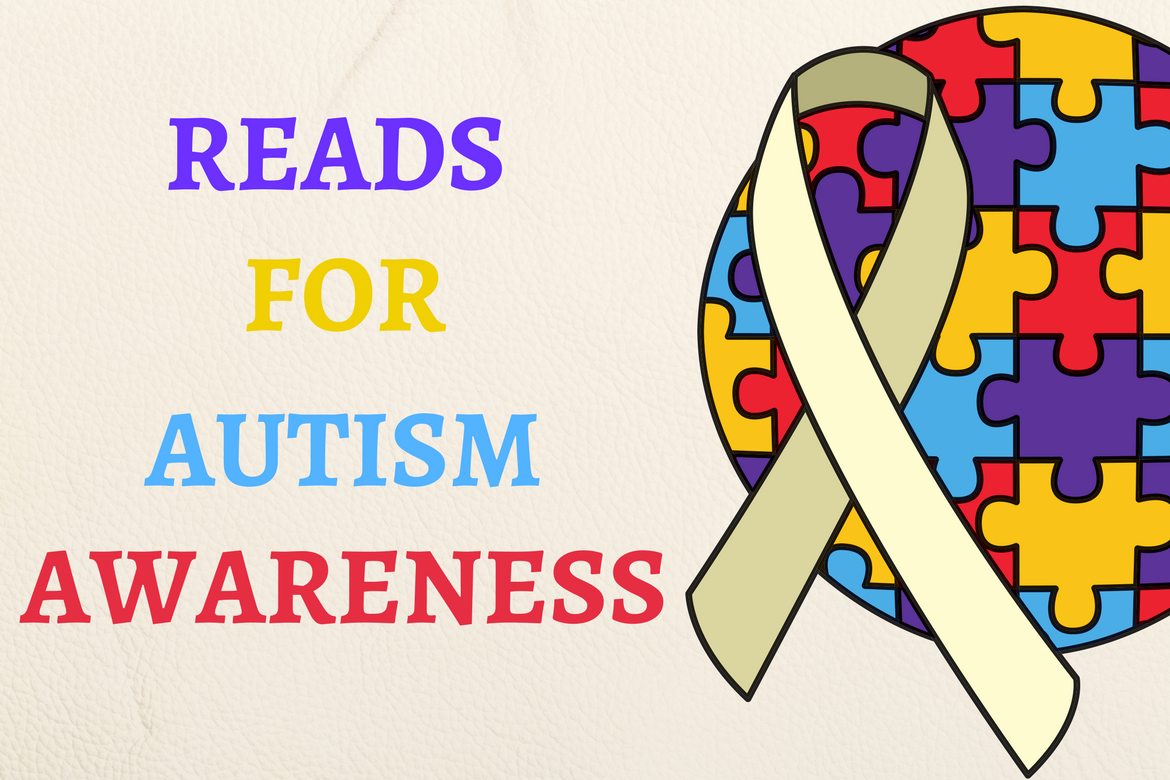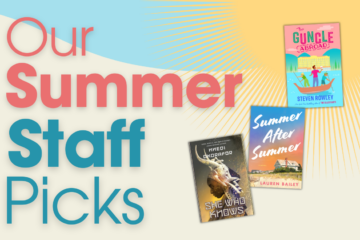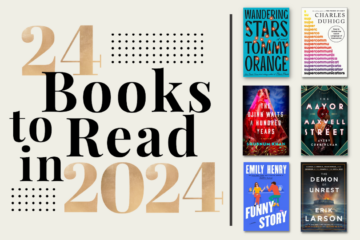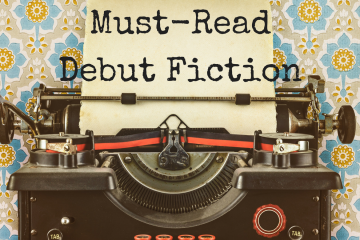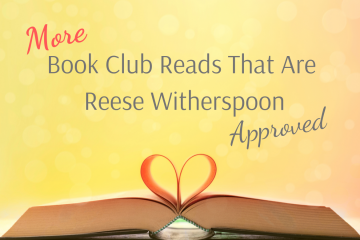April is Autism Awareness Month, so we have put together a list of some amazing stories, both true and fictional, to increase your understanding of what it’s like to be neurodivergent, or neuroatypical.
Insightful Stories of Abnormality:
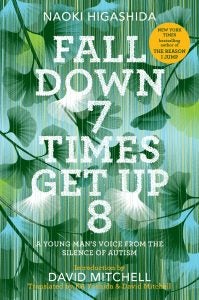 Fall Down 7 Times Get Up 8 by Naoki Higashida
Fall Down 7 Times Get Up 8 by Naoki Higashida
From the author of the bestselling The Reason I Jump, an extraordinary self-portrait of life as a young adult with autism.
In Fall Down 7 Times Get Up 8, Higashida shares his thoughts and experiences as a twenty-four-year-old man living each day with severe autism. In short, powerful chapters, Higashida explores school memories, family relationships, the exhilaration of travel, and the difficulties of speech. He also allows readers to experience profound moments we take for granted, like the thought-steps necessary for him to register that it’s raining outside. Acutely aware of how strange his behavior can appear to others, he aims throughout to foster a better understanding of autism and to encourage society to see people with disabilities as people, not as problems.
Both moving and of practical use, this book opens a window into the mind of an inspiring young man who meets every challenge with tenacity and good humor. However often he falls down, he always gets back up.
Click to Read an Excerpt.
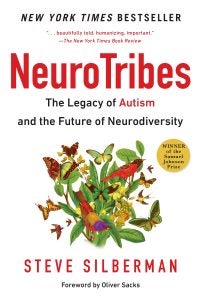
Neurotribes by Steve Silberman
This New York Times bestselling book upends conventional thinking about autism and suggests a broader model for acceptance, understanding, and full participation in society for people who think differently.
What is autism? A lifelong disability, or a naturally occurring form of cognitive difference akin to certain forms of genius? In truth, it is all of these things and more—and the future of our society depends on our understanding it.
Wired reporter Steve Silberman unearths the secret history of autism, long suppressed by the same clinicians who became famous for discovering it, and finds surprising answers to the crucial question of why the number of diagnoses has soared in recent years. Going back to the earliest days of autism research, Silberman offers a gripping narrative of Leo Kanner and Hans Asperger, the research pioneers who defined the scope of autism in profoundly different ways; he then goes on to explore the game-changing concept of neurodiversity.
NeuroTribes considers the idea that neurological differences such as autism, dyslexia, and ADHD are not errors of nature or products of the toxic modern world, but the result of natural variations in the human genome. This groundbreaking book reshapes our understanding of the history, meaning, function, and implications of neurodiversity in our world.
Click to Read an Excerpt.
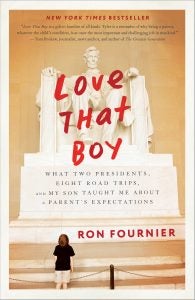
Love That Boy by Ron Fournier
“[A]n eloquent, brave, big-hearted book…about the timeless anxieties and emotions of parenthood, and the modern twists thereon.” —James Fallows, The Atlantic
A uniquely personal story about the causes and costs of outsized parental expectations. What we want for our children—popularity, normalcy, achievement, genius—and what they truly need—grit, empathy, character—are explored by National Journal’s Ron Fournier, who weaves his extraordinary journey to acceptance around the latest research on childhood development and stories of other loving-but-struggling parents.
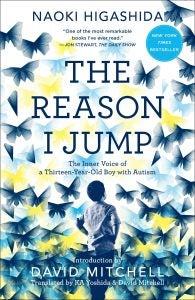
The Reason I Jump by Naoki Higashida
A one-of-a-kind memoir that demonstrates how an autistic mind thinks, feels, perceives, and responds in ways few of us can imagine. Parents and family members who never thought they could get inside the head of their autistic loved one at last have a way to break through to the curious, subtle, and complex life within.
Using an alphabet grid to painstakingly construct words, sentences, and thoughts that he is unable to speak out loud, Naoki answers even the most delicate questions that people want to know. Questions such as: “Why do people with autism talk so loudly and weirdly?” “Why do you line up your toy cars and blocks?” “Why don’t you make eye contact when you’re talking?” and “What’s the reason you jump?” (Naoki’s answer: “When I’m jumping, it’s as if my feelings are going upward to the sky.”) With disarming honesty and a generous heart, Naoki shares his unique point of view on not only autism but life itself.
His insights—into the mystery of words, the wonders of laughter, and the elusiveness of memory—are so startling, so strange, and so powerful that you will never look at the world the same way again.
Click to Read an Excerpt.
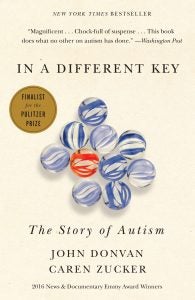
In a Different Key by John Donvan and Caren Zucker
An extraordinary narrative history of autism: the riveting story of parents fighting for their children’s civil rights; of doctors struggling to define autism; of ingenuity, self-advocacy, and profound social change.
Nearly seventy-five years ago, Donald Triplett of Forest, Mississippi, became the first child diagnosed with autism. Beginning with his family’s odyssey, In a Different Key tells the extraordinary story of this often misunderstood condition, and of the civil rights battles waged by the families of those who have it. Unfolding over decades, it is a beautifully rendered history of ordinary people determined to secure a place in the world for those with autism—by liberating children from dank institutions, campaigning for their right to go to school, challenging expert opinion on what it means to have autism, and persuading society to accept those who are different.
By turns intimate and panoramic, In a Different Key takes us on a journey from an era when families were shamed and children were condemned to institutions to one in which a cadre of people with autism push not simply for inclusion, but for a new understanding of autism: as difference rather than disability.
Click to Read an Excerpt.
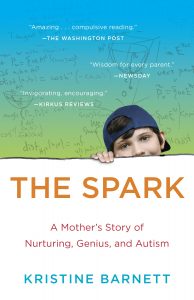
The Spark by Kristine Barnett
A remarkable memoir of mother and son about the power of love and courage in the face of overwhelming obstacles, and the dazzling possibilities that can occur when we learn how to tap the true potential that lies within every child, and in all of us.
Surrounded by “experts” at home and in special ed who tried to focus on Jake’s most basic skills and curtail his distracting interests—moving shadows on the wall, stars, plaid patterns on sofa fabric—Jake made no progress, withdrew more and more into his own world, and eventually stopped talking completely. Kristine knew in her heart that she had to make a change. Against the advice of her husband, Michael, and the developmental specialists, Kristine followed her instincts, pulled Jake out of special ed, and began preparing him for mainstream kindergarten on her own.
Relying on the insights she developed at the daycare center she runs out of the garage in her home, Kristine resolved to follow Jacob’s “spark”—his passionate interests. Why concentrate on what he couldn’t do? Why not focus on what he could? This basic philosophy, along with her belief in the power of ordinary childhood experiences (softball, picnics, s’mores around the campfire) and the importance of play, helped Kristine overcome huge odds.
The Barnetts were not wealthy people, and in addition to financial hardship, Kristine herself faced serious health issues. But through hard work and determination on behalf of Jake and his two younger brothers, as well as an undying faith in their community, friends, and family, Kristine and Michael prevailed. The results were beyond anything anyone could have imagined.
Click to Read an Excerpt.
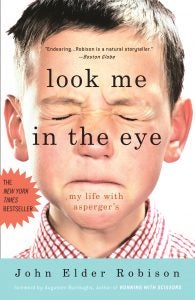
Look Me in the Eye by John Elder Robison
Ever since he was young, John Robison longed to connect with other people, but by the time he was a teenager, his odd habits—an inclination to blurt out non sequiturs, avoid eye contact, dismantle radios, and dig five-foot holes (and stick his younger brother, Augusten Burroughs, in them)—had earned him the label “social deviant.” It was not until he was forty that he was diagnosed with a form of autism called Asperger’s syndrome. That understanding transformed the way he saw himself—and the world.
A born storyteller, Robison has written a moving, darkly funny memoir about a life that has taken him from developing exploding guitars for KISS to building a family of his own. It’s a strange, sly, indelible account—sometimes alien yet always deeply human.
Click to Read an Excerpt.
Click for a Teacher’s Guide.
Atypical Protagonists:
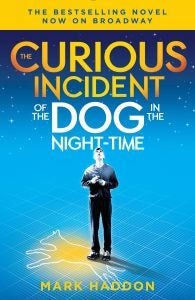
The Curious Incident of the Dog in the Night-Time by Mark Haddon
Christopher John Francis Boone knows all the countries of the world and their capitals and every prime number up to 7,057. He relates well to animals but has no understanding of human emotions. He cannot stand to be touched. And he hates the color yellow.
The improbable story of Christopher’s quest as he investigates the suspicious death of a neighborhood dog makes for one of the most captivating, unusual, and widely heralded novels in recent years.
Click to Read an Excerpt.
Click for a Discussion Guide.
Click to Watch the National Theatre Production Trailer.
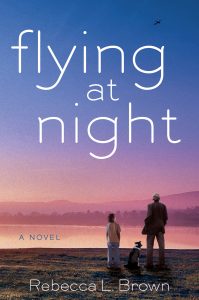
Flying at Night by Rebecca L. Brown
An emotionally charged debut novel of a family on the brink—an autistic child, his determined mother, and her distant father—who learn that when your world changes, you find out who you really are.
While she was growing up, Piper’s father, Lance “the Silver Eagle” Whitman, became a national hero piloting a plane through an emergency landing. But at home, he was a controlling and overbearing presence in her life, raining emotional and verbal abuse upon the entire family.
It’s no surprise, then, that as an adult, Piper has poured all of her energy into creating a warm and loving home for her own family, while catering to her son Fred’s ever-growing idiosyncrasies.
Then Lance has a heart attack, leaving him with a brain injury—and dependent upon Piper for his care—just before tests confirm Piper’s suspicions that Fred is on the autism spectrum.
A powerful and extraordinary novel, Flying at Night gives voice to Fred, trying to find his place in a world that doesn’t quite understand him; to Lance, who’s lost what made him the man he was, for better and worse; and to Piper, who, while desperately trying to navigate the shifting landscape around her, watches as her son and father start to connect—in the most miraculous ways.
Click to Read an Excerpt.
Click for a Discussion Guide.
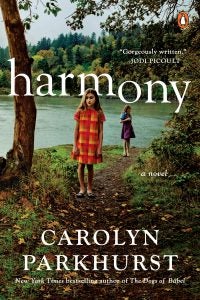
Harmony by Carolyn Parkhurst
From the New York Times bestselling author of The Dogs of Babel, a taut, emotionally wrenching story of how a seemingly “normal” family could become desperate enough to leave everything behind and move to a “family camp” in New Hampshire—a life-changing experience that alters them forever.
How far will a mother go to save her family? The Hammond family is living in DC, where everything seems to be going just fine, until it becomes clear that the oldest daughter, Tilly, is developing abnormally—a mix of off-the-charts genius and social incompetence. Once Tilly—whose condition is deemed undiagnosable—is kicked out of the last school in the area, her mother Alexandra is out of ideas.
The family turns to Camp Harmony and the wisdom of child behavior guru Scott Bean for a solution. But what they discover in the woods of New Hampshire will push them to the very limit. Told from the alternating perspectives of both Alexandra and her younger daughter Iris (the book’s Nick Carraway), this is a unputdownable story about the strength of love, the bonds of family, and how you survive the unthinkable.
Click to Read an Excerpt.
Click for a Discussion Guide.

